Unit 5 What were you doing when the rainstorm came 重要知识点复习课件
文档属性
| 名称 | Unit 5 What were you doing when the rainstorm came 重要知识点复习课件 | 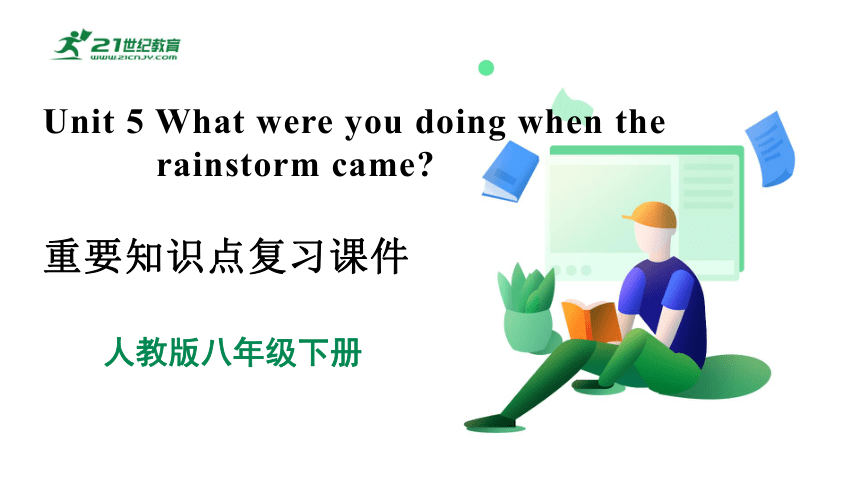 | |
| 格式 | pptx | ||
| 文件大小 | 1.0MB | ||
| 资源类型 | 试卷 | ||
| 版本资源 | 人教新目标(Go for it)版 | ||
| 科目 | 英语 | ||
| 更新时间 | 2022-07-07 10:26:40 | ||
图片预览

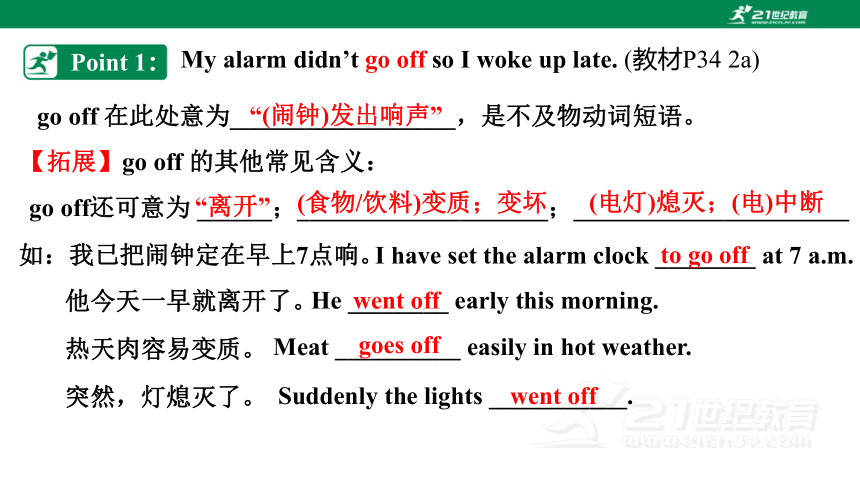
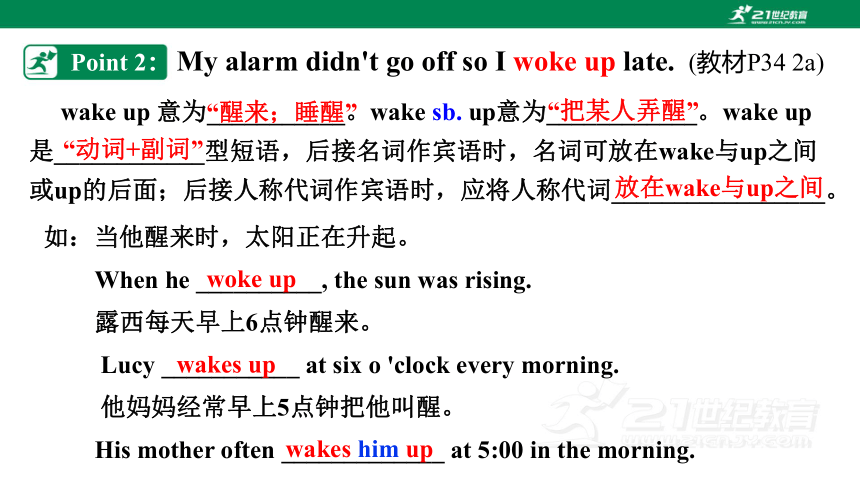
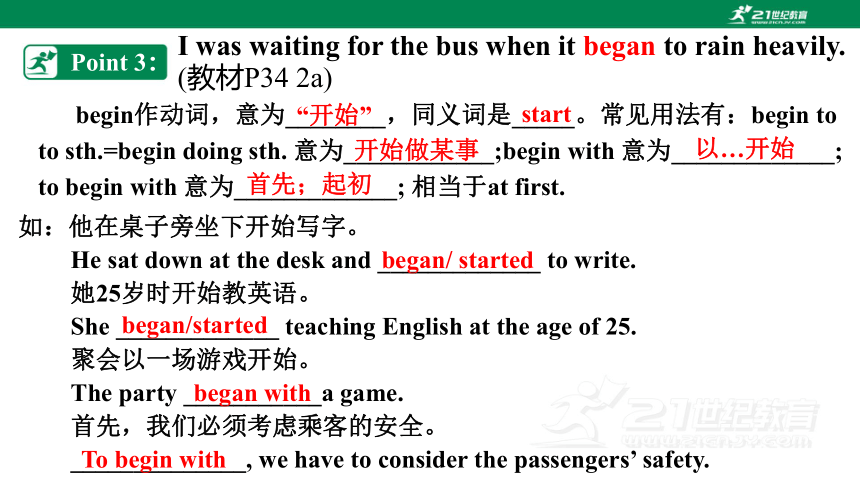
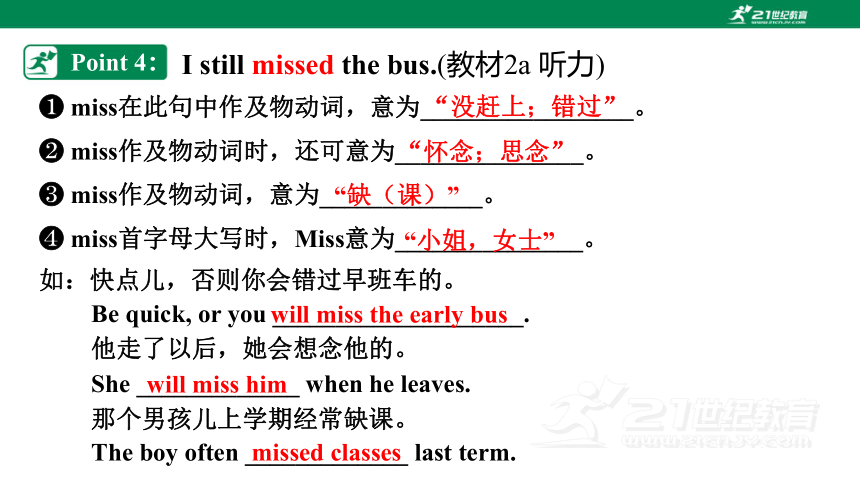
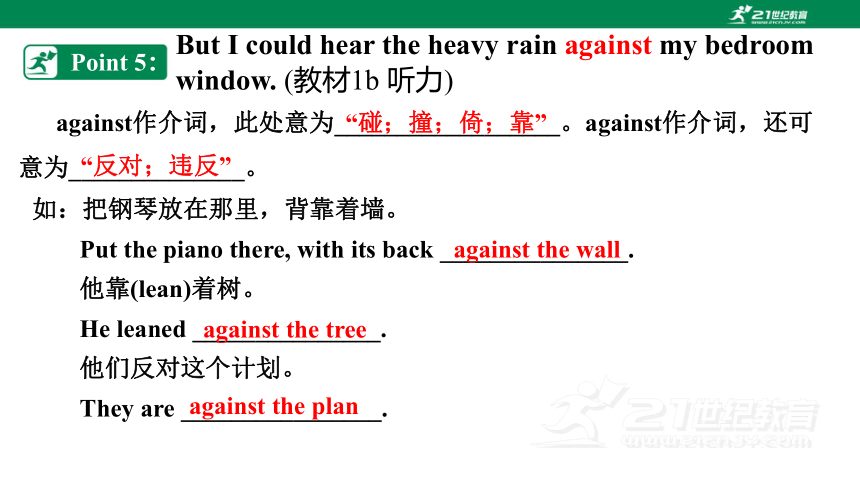
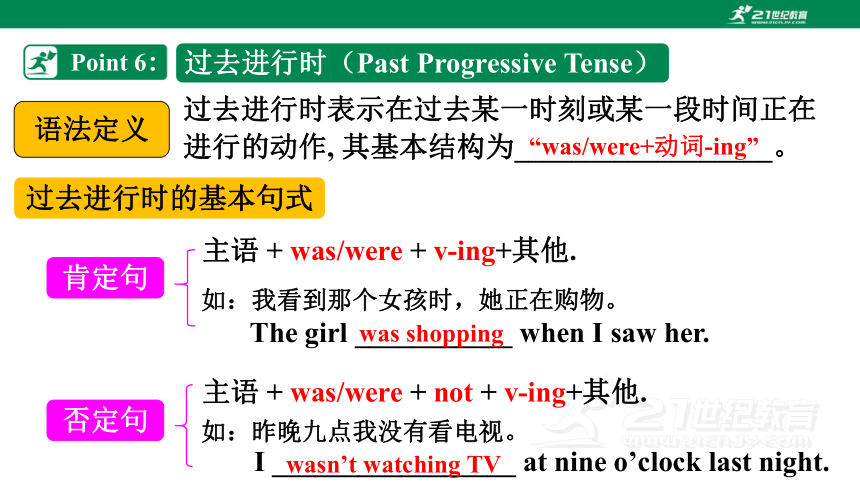
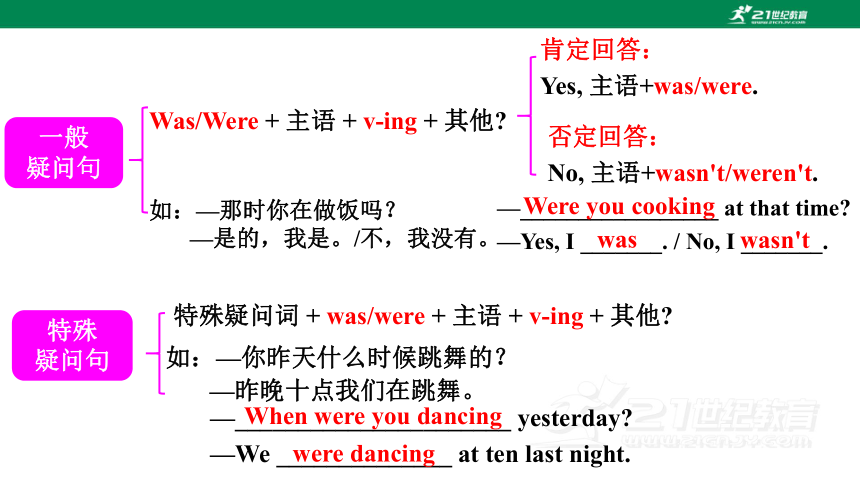
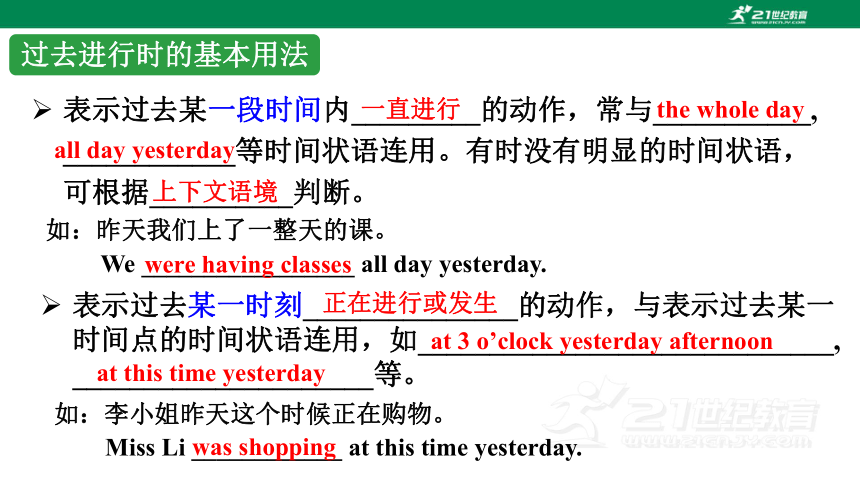
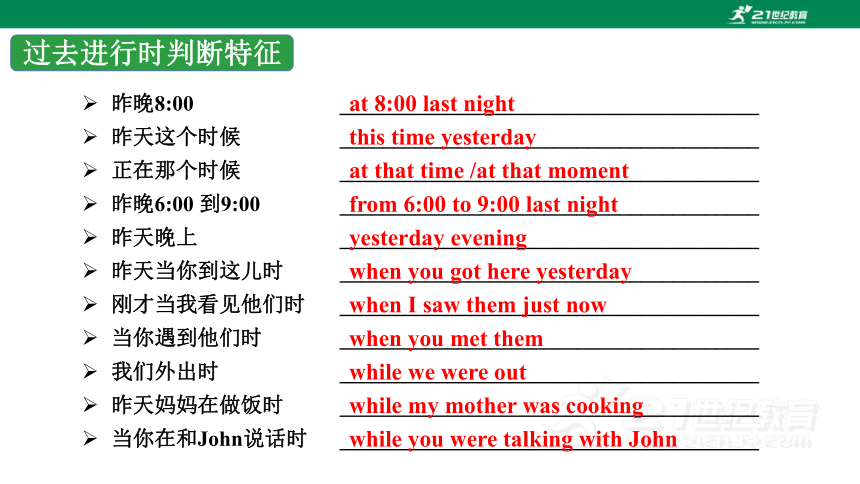
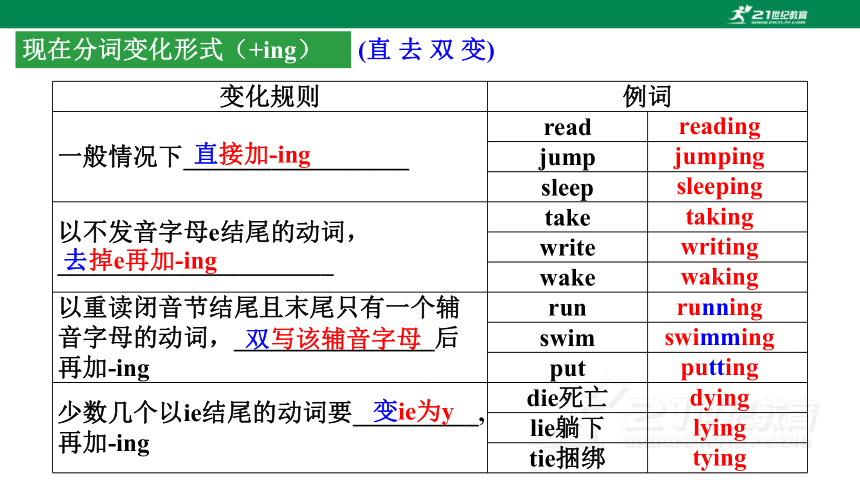
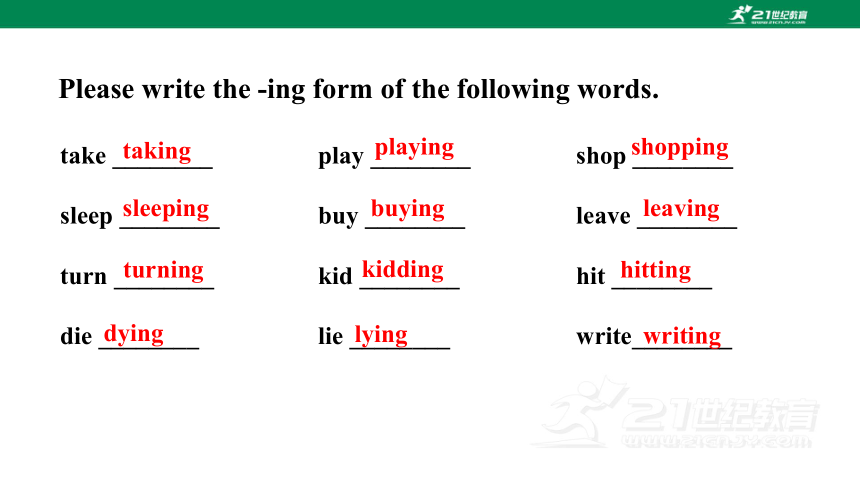
文档简介
(共35张PPT)
Unit 5 What were you doing when the
rainstorm came
重要知识点复习课件
人教版八年级下册
Point 1:
My alarm didn’t go off so I woke up late. (教材P34 2a)
go off 在此处意为__________________,是不及物动词短语。
“(闹钟)发出响声”
【拓展】go off 的其他常见含义:
go off还可意为 ______;____________________;______________________
“离开”
(食物/饮料)变质;变坏
(电灯)熄灭;(电)中断
如:我已把闹钟定在早上7点响。
I have set the alarm clock ________ at 7 a.m.
to go off
他今天一早就离开了。
He ________ early this morning.
went off
热天肉容易变质。
Meat __________ easily in hot weather.
goes off
突然,灯熄灭了。
Suddenly the lights ___________.
went off
Point 2:
My alarm didn't go off so I woke up late. (教材P34 2a)
wake up 意为___________。wake sb. up意为____________。wake up是____________型短语,后接名词作宾语时,名词可放在wake与up之间或up的后面;后接人称代词作宾语时,应将人称代词_________________。
“醒来;睡醒”
“把某人弄醒”
“动词+副词”
放在wake与up之间
如:当他醒来时,太阳正在升起。
When he __________, the sun was rising.
露西每天早上6点钟醒来。
Lucy ___________ at six o 'clock every morning.
他妈妈经常早上5点钟把他叫醒。
His mother often _____________ at 5:00 in the morning.
woke up
wakes up
wakes him up
Point 3:
I was waiting for the bus when it began to rain heavily. (教材P34 2a)
begin作动词,意为________,同义词是_____。常见用法有:begin to to sth.=begin doing sth. 意为____________;begin with 意为_____________; to begin with 意为_____________; 相当于at first.
“开始”
start
开始做某事
以…开始
首先;起初
如:他在桌子旁坐下开始写字。
He sat down at the desk and _____________ to write.
她25岁时开始教英语。
She _____________ teaching English at the age of 25.
聚会以一场游戏开始。
The party ___________a game.
首先,我们必须考虑乘客的安全。
began/ started
began/started
______________, we have to consider the passengers’ safety.
began with
To begin with
Point 4:
I still missed the bus.(教材2a 听力)
miss在此句中作及物动词,意为_________________。
miss作及物动词时,还可意为_______________。
miss作及物动词,意为_____________。
miss首字母大写时,Miss意为_______________。
“没赶上;错过”
“怀念;思念”
“缺(课)”
“小姐,女士”
如:快点儿,否则你会错过早班车的。
Be quick, or you ____________________.
他走了以后,她会想念他的。
She _____________ when he leaves.
那个男孩儿上学期经常缺课。
The boy often _____________ last term.
will miss the early bus
will miss him
missed classes
Point 5:
But I could hear the heavy rain against my bedroom window. (教材1b 听力)
against作介词,此处意为__________________。against作介词,还可意为______________。
“碰;撞;倚;靠”
“反对;违反”
如:把钢琴放在那里,背靠着墙。
他靠(lean)着树。
He leaned _______________.
Put the piano there, with its back _______________.
他们反对这个计划。
They are ________________.
against the wall
against the tree
against the plan
Point 6:
过去进行时(Past Progressive Tense)
语法定义
过去进行时表示在过去某一时刻或某一段时间正在进行的动作, 其基本结构为__________________。
过去进行时的基本句式
The girl ___________ when I saw her.
主语 + was/were + v-ing+其他.
主语 + was/were + not + v-ing+其他.
I _________________ at nine o’clock last night.
肯定句
否定句
“was/were+动词-ing”
如:我看到那个女孩时,她正在购物。
was shopping
wasn’t watching TV
如:昨晚九点我没有看电视。
—_________________ at that time
—Yes, I _______. / No, I _______.
Was/Were + 主语 + v-ing + 其他
特殊疑问词 + was/were + 主语 + v-ing + 其他
—______________________ yesterday
—We ______________ at ten last night.
一般
疑问句
特殊
疑问句
肯定回答:
Yes, 主语+was/were.
否定回答:
No, 主语+wasn't/weren't.
如:—那时你在做饭吗?
—是的,我是。/不,我没有。
Were you cooking
was
wasn't
如:—你昨天什么时候跳舞的?
—昨晚十点我们在跳舞。
When were you dancing
were dancing
过去进行时的基本用法
We _________________ all day yesterday.
表示过去某一段时间内_________的动作,常与___________, ____________等时间状语连用。有时没有明显的时间状语,可根据__________判断。
Miss Li ____________ at this time yesterday.
表示过去某一时刻_______________的动作,与表示过去某一时间点的时间状语连用,如_____________________________, _____________________等。
the whole day
all day yesterday
一直进行
上下文语境
如:昨天我们上了一整天的课。
were having classes
正在进行或发生
at 3 o’clock yesterday afternoon
at this time yesterday
如:李小姐昨天这个时候正在购物。
was shopping
过去进行时判断特征
昨晚8:00 _______________________________________
昨天这个时候 _______________________________________
正在那个时候 _______________________________________
昨晚6:00 到9:00 _______________________________________
昨天晚上 _______________________________________
昨天当你到这儿时 _______________________________________
刚才当我看见他们时 _______________________________________
当你遇到他们时 _______________________________________
我们外出时 _______________________________________
昨天妈妈在做饭时 _______________________________________
当你在和John说话时 _______________________________________
at 8:00 last night
this time yesterday
at that time /at that moment
from 6:00 to 9:00 last night
yesterday evening
when you got here yesterday
when I saw them just now
when you met them
while we were out
while my mother was cooking
while you were talking with John
现在分词变化形式(+ing)
(直 去 双 变)
变化规则 例词 一般情况下__________________ read
jump
sleep
以不发音字母e结尾的动词,______________________ take
write
wake
以重读闭音节结尾且末尾只有一个辅音字母的动词,________________后再加-ing run
swim
put
少数几个以ie结尾的动词要__________, 再加-ing die死亡
lie躺下
tie捆绑
直接加-ing
去掉e再加-ing
双写该辅音字母
变ie为y
reading
jumping
sleeping
taking
writing
waking
running
swimming
putting
dying
lying
tying
take ________ play ________ shop ________
sleep ________ buy ________ leave ________
turn ________ kid ________ hit ________
die ________ lie ________ write________
Please write the -ing form of the following words.
taking
sleeping
turning
playing
buying
kidding
shopping
leaving
hitting
dying
lying
writing
Point 7:
过去进行时与其他时态的区别
现在进行时 一般过去时 过去进行时
用法 表示___________正在进行和发生的动作。 表示____________发生过的动作或存在的状态。强调动作_________。 表示_____________________正在进行的动作。强调动作的_________。
构成
时间
现在或最近
过去某个时间
已经结束
过去某一时刻或某一时间
未完成性
主语+am/is/are+v-ing
主语+v-ed
主语+was/were+v-ing
now(或引起注意的look/ listen等动词)
yesterday, last night, two years ago
at eight last night, at the time of the rainstorm, when the rainstorm came, while he was sleeping
when和while引导的时间状语从句
Point 7:
when引导的时间状语从句,表示主句动作发生的特定时间,既可指_________,也可指________。从句的谓语动词可以是__________,也可以是____________;从句的动作和主句的动作既可_________,也可以是___________。
when和while都可意为____________,用来引导时间状语从句。
“当……时候”
时间点
时间段
延续性动词
非延续性动词
同时发生
先后发生
如:当他还是个孩子的时候,他总是尝试新的想法。
____________________, he always tried out new ideas.
It was snowing __________________ the station.
他到达车站时正在下雪。
When he was a child
when he arrived at
____________ the airport, the guests had left.
when引导的时间状语从句,从句可位于主句____________,当位于主句之前时,与主句要用______分开。
when引导的时间状语从句,当主句为__________________意义时,从句要用___________表示将来。
The boy will be a writer ______ he ______ up.
之前或之后
逗号
如:当我到达机场时,客人们已经离开了。
将来时或表示将来意义
一般现在时
(主将从现)
如:这个男孩长大后将成为一名作家。
when
grows
When I got to
while引导的时间状语从句强调主句动作在从句动作进行的过程中发生,或者_________。从句的谓语动词必须为________,常用_______。
同时发生
延续性动词
进行时
如:琳达睡觉时,珍妮在帮我做作业。
我在读故事时,那个男孩睡着了。
The boy fell asleep __________________ the story.
_____________________, Jenny ____________ me with my homework.
While Linda was sleeping
was helping
while I was reading
Point 8:
You're kidding! (教材P36 4c)
kid作动词,意为“开玩笑;欺骗 ”,其现在分词为kidding,过去式和过去分词均为kidded。
如:我不是故意的。我只是开玩笑。
I didn't mean it. I ________________.
别骗自己,他会改变的。
Don't _____________ (that) he'll change.
【拓展】kid还可以作名词,意为“小孩”,复数形式为kids。正式用语或书面用语中用child表示。
如:们有三个孩子。
They've got __________.
他只是个孩子。
He is just a __________.
was only kidding
kid yourself
three kids
child/kid
Point 9:
Ben was helping his mom make dinner when the rain began to beat heavily against the windows.
beat作不及物动词,意为_______________________________________。beat作及物动词,意为_______________。其过去时为________其过去分词________。
“敲打;(多次或连续)撞击,拍打;(心脏、脉搏等)跳动”
“打;敲;打败”
beat
beaten
如:雨在猛击窗户。
The rain _________________________________.
珍妮弗的心跳得很快。
Jennifer's heart ____________ fast.
谁在敲鼓
Who's ___________________
我们以10比4打败了他们。
We ___________ by 10:4.
is beating heavily against the window
was beating
beating the drum
beat them
win意为_________________,指在竞赛或战争中获得胜利,其宾语多为表示________________________等的名词。
beat意为_______,指在__________中击败对手,其宾语是比赛或竞争的______。
“获胜;赢,赢得”
游戏或竞赛
比赛\战争\奖品\金钱\奖牌
对手
“打败”
Point 10:
【辨析】too,also,either与as well
too,also,either与as well都可意为______,其区别如下:
“也”
too 一般用于_______句末,意为“也”,并用__________。
as well 一般用于________句末,意为“也”,______________。
also 用于_________中,常位于________________________之后,____________之前,意为“也”
either 一般用于_________句末,意为___________。
肯定句
系动词、助动词或情态动词
实义动词
肯定句
逗号隔开
不用逗号隔开
否定句
“也(不)”
肯定句
如:我8点钟又打电话,你那时也没接。
I called again at eight and you didn’t answer then, _______.
她说英语,也说法语。
She speaks English and she ______ speaks French.
他也得去。
He has to go ________.
见到你我也很高兴。
Nice to meet you, ________.
too
also
either
as well
Point 11:
With no light outside, it felt like midnight.(教材P35 3a)
light作不可数名词,意为________________。
如:他在烛光下读那封信。
He read the letter by ____________________.
light作形容词,意为_______________。
如:那个箱子是重的还是轻的?
Is the box ______________
你穿浅色很好看。
You look nice _______________.
light(lit/lighted)作动词,意为_____________。
如:我点不着蜡烛。
I couldn't get the candles ___________.
“光;光亮;光线”
“轻的;浅色的”
“点燃;照亮”
the light of the candle
heavy or light
to light
in light colors
Point 12:
Ben's dad was putting pieces of wood over the windows while his mom was making sure the flashlights and radio were working.(教材P35 3a)
wood作不可数名词,意为__________________。a piece of wood意为___________。wood作可数名词,意为_________,常用__________。
“木;木头;木材”
“一块木头”
树林”
复数形式
如:她家的房子是木头建的。
Her house _________________.
他往火里添了些木柴。
He put ___________ in the fire.
她害怕晚上经过那片树林。
She is afraid to walk _________________ at night.
was made of wood
some wood
through the woods
Point 13:
He finally fell asleep when the wind was dying down at around 3:00 a.m. (教材P35 3a)
【易混辨析】sleepy, asleep, sleep与sleeping
sleepy 形容词,意为_________________,可作____________。
asleep 形容词,意为_______,通常用作_____,不用作______。
sleep 可作动词和名词,意为______。
sleeping 形容词,意为_________;通常用作定语,表示与_______________,如sleeping bag, sleeping car等。
“困倦的;瞌睡的”
“睡着”
定语
表语和定语
“睡觉的”
睡觉有关的东西
表语
“睡觉”
如:小男孩困得在睡袋里睡着了。他现在正在睡觉。不要制造噪音
The little boy was so ______ that he fell ______ in the _________ bag. He is ________ now. Don't make noise.
sleepy
asleep
sleeping
sleeping
Point 14:
When he woke up, the sun was rising. (教材P35 3a)
【易混】rise与raise
rise (_______, ________) 不及物动词,意为___________________,强调主语在__________________等方面的增加,比如____________、___________、_____________等。
raise (______, _______) 及物动词,意为_____________,说明主语发出的动作是要作用于其他事物的,比如______、________等。
rose
risen
raised
raised
“升起;增加;提高”
位置、数量或价值
太阳的升起
价格的上涨
温度的上升
“举起;提升”
举手
升国旗
如:昨天下午河水上涨了。
The river _____ yesterday afternoon.
我回家时,月亮正在升起。
The moon __________ when I went home.
请举起手!
Please ________ your hands!
rose
was rising
raise
Point 15:
Fallen trees, broken windows and rubbish were everywhere.(教材P35 3a)
fallen在此处作形容词,意为___________________,仅用于名词前作定语。fallen leaves 意为_________。
【拓展延伸】fallen还是动词fall(落下,掉落)的过去分词形式。
“倒下的;落下的”
“落叶”
如: 秋天是一个有新鲜空气和落叶的美丽季节
Autumn is a beautiful season with fresh air and ____________.
几本书掉到了地板上。
Several of the books __________ onto the floor.
fallen leaves
have fallen
Point 16:
When the school basketball competition started, Kate was still making her way to school. (教材P37 1d)
make one’s way意为____________________,常与介词__________连用,表示方向,后接表示____________。
“前往;费力地前进”
to/towards
地点的名词
如:我们穿过人群慢慢地向购物中心走去。
We slowly ________________ the mall through the crowd.
made our way to
【拓展】有关way的短语:
by the way in a way
lose one's way in the/one’s way
on the way on one's way to
顺便说一下
在某种程度上
迷路
在路上
挡路;妨碍
在去……的路上
Point 17:
I left my phone at home./I left my house late (教材P37 1b听力)
leave及物动词,意为_______,强调的是“从原来的地方离开”,leave后可以直接接地点名词作宾语。“leave+地点”表示___________。
“离开”
“离开某地”
leave用作不及物动词时,常与介词for连用,“leave for+地点”表示__________, 只表示方向,而不涉及到达与否。
“动身去某地”
“leave+地点+for+地点”表示__________________。
“离开某地去某地”
“leave sth +地点”指的是_____________________,切记不能用________。
把某物落/忘记在某处
forget
你什么时候离开上海的?
When did you ______________
下周五。爱丽丝要去伦敦了。
Next Friday. Alice is ___________ London.
你为什么要离开上海去北京?
Why are you _________________________
她昨天把书忘在家里了。
She ___________________ yesterday.
leave Shanghai
left her book at home
leaving for
leaving Shanghai for Beijing
Point 18:
More recently, most Americans remember what ... by terrorists. (教材P38 2b)
recently作副词,意为______________;可用于一般过去时(表示时间点)或现在完成时(表示一段时间)中。
“不久前;最近”
【拓展】recent作形容词,意为_________,修饰名词。
“最近的”
如:我们最近收到了他的一封信。
We received a letter from him _________.
我最近很累。
I have been very tired _________.
近年来,我们的生活方式发生了很大变化。
Our way of life has changed a great deal in ______ years.
recently
recently
recent
Point 19:
Kate didn't think her friend was telling the truth about the event. (教材P39 2c)
truth在此处作不可数名词,意为____________;是________的名词形式。true adj.符合事实的; truly adv.真正;确实。to tell the truth__________。
“实情;事实”
true
“说实话”
如:这掩盖不了真相。
That cannot _______________.
说实话,我不想去参加聚会。
_________________, I don't want to go to the party.
的确,年轻人非常喜欢这种新型的共享自行车。你应该相信真相。
It is ______ that young people ________ love this new kind of shared bikes. You should _______________.
hide the truth
To tell the truth
true
truly
believe the truth
Point 20:
I was so scared that I could hardly think clearly after that. (教材P38 2b)
hardly 副词 意为_____________________,表_______。 修饰动词或与ever连用构成hardly ever 意为:_____________
hard 副词 意为__________________多说明雨、雪等下得大,相当于_______。还可意为_________。
形容词 意为_________,________________
“几乎不,几乎没有”
否定
几乎从不
“大量地;猛烈地”
heavily
“努力地”
“困难的”
“硬的,难懂的”
昨天雨下得很大。
这个问题很难解决。
It rained _________ yesterday.
The problem is ________.
汤姆学习努力并且取得了好成绩。
Tom ____________ and gets good grades.
冰箱里几乎没有食物了。
There is _______ any food in the fridge.
试卷中有些很难的问题。
There were some very _____________ on the exam paper.
very hard
very hard
works hard
hardly
hard questions
修饰动词
修饰名词
Point 21:
My parents did not talk after that, and we finished the rest of our dinner in silence.(教材P38 2b)
the rest of … 意为______________
in silence 意为___________
有人想要这剩余的比萨饼吗?
Does anyone want ___________________
汤姆来自英国,我们其余的人来自中国。
Tom is from England and _______________ are from China.
这四个人一声不吭地坐着。
The four men sat ____________.
她默默地吃着晚饭
She is eating dinner ___________.
the rest of this pizza
the rest of us
in silence
in silence
剩余的……
沉默,无声
Point 22:
More recently, most Americans remember what they were doing when the World Trade Center in New York was taken down by terrorists.(教材P38 2b)
take down意为_____________。take down还可意为______________。与_____________同义短语。
“拆掉;拆除”
“写下,记下”
write down
你能帮我拆除这顶帐篷吗?
Could you please help me ___________________
我忘了记下他的电话号码了。
I forgot to _____________________________.
take down this tent
take down his telephone number
Point 23:
I had trouble thinking clearly after that because I was very afraid. (教材P38 2d)
have trouble (in) doing sth.为固定短语,意为______________________;_________________________”。同义短语___________________________/ _________________________________/______________________________/ _________________________。
“做某事有困难或问题
在某方面有困难或问题
have difficulty (in) doing sth.
have a hard time (in) doing sth.
have problems (in) doing sth.
have problems with sth.
成千上万的人都有难以入睡的困扰。
Thousands of people _________________________.
他毫不费劲地找到了一份工作。
He _________________________.
have trouble falling asleep
had no trouble finding a job
Point 24:
But when I pointed it out to my friend, it went away. (教材P40 1)
point out 意为_______,是____________型短语,人称代词作宾语时应放在________________。
“指出”
“动词+副词”
动词与副词之间
【拓展】point to意为_______,所指的物体______,point at意为_________,所指的物体_______。
“指向”
“指着”
较远
较近
这个句子中有一处错误,你能把它指出来吗?
There is a mistake in this sentence. Can you ____________
老师指出了我作业中的许多错误。
The teacher ________________________ in my homework.
point it out
pointed out many mistakes
谢谢
21世纪教育网(www.21cnjy.com)
中小学教育资源网站
兼职招聘:
https://www.21cnjy.com/recruitment/home/admin
Unit 5 What were you doing when the
rainstorm came
重要知识点复习课件
人教版八年级下册
Point 1:
My alarm didn’t go off so I woke up late. (教材P34 2a)
go off 在此处意为__________________,是不及物动词短语。
“(闹钟)发出响声”
【拓展】go off 的其他常见含义:
go off还可意为 ______;____________________;______________________
“离开”
(食物/饮料)变质;变坏
(电灯)熄灭;(电)中断
如:我已把闹钟定在早上7点响。
I have set the alarm clock ________ at 7 a.m.
to go off
他今天一早就离开了。
He ________ early this morning.
went off
热天肉容易变质。
Meat __________ easily in hot weather.
goes off
突然,灯熄灭了。
Suddenly the lights ___________.
went off
Point 2:
My alarm didn't go off so I woke up late. (教材P34 2a)
wake up 意为___________。wake sb. up意为____________。wake up是____________型短语,后接名词作宾语时,名词可放在wake与up之间或up的后面;后接人称代词作宾语时,应将人称代词_________________。
“醒来;睡醒”
“把某人弄醒”
“动词+副词”
放在wake与up之间
如:当他醒来时,太阳正在升起。
When he __________, the sun was rising.
露西每天早上6点钟醒来。
Lucy ___________ at six o 'clock every morning.
他妈妈经常早上5点钟把他叫醒。
His mother often _____________ at 5:00 in the morning.
woke up
wakes up
wakes him up
Point 3:
I was waiting for the bus when it began to rain heavily. (教材P34 2a)
begin作动词,意为________,同义词是_____。常见用法有:begin to to sth.=begin doing sth. 意为____________;begin with 意为_____________; to begin with 意为_____________; 相当于at first.
“开始”
start
开始做某事
以…开始
首先;起初
如:他在桌子旁坐下开始写字。
He sat down at the desk and _____________ to write.
她25岁时开始教英语。
She _____________ teaching English at the age of 25.
聚会以一场游戏开始。
The party ___________a game.
首先,我们必须考虑乘客的安全。
began/ started
began/started
______________, we have to consider the passengers’ safety.
began with
To begin with
Point 4:
I still missed the bus.(教材2a 听力)
miss在此句中作及物动词,意为_________________。
miss作及物动词时,还可意为_______________。
miss作及物动词,意为_____________。
miss首字母大写时,Miss意为_______________。
“没赶上;错过”
“怀念;思念”
“缺(课)”
“小姐,女士”
如:快点儿,否则你会错过早班车的。
Be quick, or you ____________________.
他走了以后,她会想念他的。
She _____________ when he leaves.
那个男孩儿上学期经常缺课。
The boy often _____________ last term.
will miss the early bus
will miss him
missed classes
Point 5:
But I could hear the heavy rain against my bedroom window. (教材1b 听力)
against作介词,此处意为__________________。against作介词,还可意为______________。
“碰;撞;倚;靠”
“反对;违反”
如:把钢琴放在那里,背靠着墙。
他靠(lean)着树。
He leaned _______________.
Put the piano there, with its back _______________.
他们反对这个计划。
They are ________________.
against the wall
against the tree
against the plan
Point 6:
过去进行时(Past Progressive Tense)
语法定义
过去进行时表示在过去某一时刻或某一段时间正在进行的动作, 其基本结构为__________________。
过去进行时的基本句式
The girl ___________ when I saw her.
主语 + was/were + v-ing+其他.
主语 + was/were + not + v-ing+其他.
I _________________ at nine o’clock last night.
肯定句
否定句
“was/were+动词-ing”
如:我看到那个女孩时,她正在购物。
was shopping
wasn’t watching TV
如:昨晚九点我没有看电视。
—_________________ at that time
—Yes, I _______. / No, I _______.
Was/Were + 主语 + v-ing + 其他
特殊疑问词 + was/were + 主语 + v-ing + 其他
—______________________ yesterday
—We ______________ at ten last night.
一般
疑问句
特殊
疑问句
肯定回答:
Yes, 主语+was/were.
否定回答:
No, 主语+wasn't/weren't.
如:—那时你在做饭吗?
—是的,我是。/不,我没有。
Were you cooking
was
wasn't
如:—你昨天什么时候跳舞的?
—昨晚十点我们在跳舞。
When were you dancing
were dancing
过去进行时的基本用法
We _________________ all day yesterday.
表示过去某一段时间内_________的动作,常与___________, ____________等时间状语连用。有时没有明显的时间状语,可根据__________判断。
Miss Li ____________ at this time yesterday.
表示过去某一时刻_______________的动作,与表示过去某一时间点的时间状语连用,如_____________________________, _____________________等。
the whole day
all day yesterday
一直进行
上下文语境
如:昨天我们上了一整天的课。
were having classes
正在进行或发生
at 3 o’clock yesterday afternoon
at this time yesterday
如:李小姐昨天这个时候正在购物。
was shopping
过去进行时判断特征
昨晚8:00 _______________________________________
昨天这个时候 _______________________________________
正在那个时候 _______________________________________
昨晚6:00 到9:00 _______________________________________
昨天晚上 _______________________________________
昨天当你到这儿时 _______________________________________
刚才当我看见他们时 _______________________________________
当你遇到他们时 _______________________________________
我们外出时 _______________________________________
昨天妈妈在做饭时 _______________________________________
当你在和John说话时 _______________________________________
at 8:00 last night
this time yesterday
at that time /at that moment
from 6:00 to 9:00 last night
yesterday evening
when you got here yesterday
when I saw them just now
when you met them
while we were out
while my mother was cooking
while you were talking with John
现在分词变化形式(+ing)
(直 去 双 变)
变化规则 例词 一般情况下__________________ read
jump
sleep
以不发音字母e结尾的动词,______________________ take
write
wake
以重读闭音节结尾且末尾只有一个辅音字母的动词,________________后再加-ing run
swim
put
少数几个以ie结尾的动词要__________, 再加-ing die死亡
lie躺下
tie捆绑
直接加-ing
去掉e再加-ing
双写该辅音字母
变ie为y
reading
jumping
sleeping
taking
writing
waking
running
swimming
putting
dying
lying
tying
take ________ play ________ shop ________
sleep ________ buy ________ leave ________
turn ________ kid ________ hit ________
die ________ lie ________ write________
Please write the -ing form of the following words.
taking
sleeping
turning
playing
buying
kidding
shopping
leaving
hitting
dying
lying
writing
Point 7:
过去进行时与其他时态的区别
现在进行时 一般过去时 过去进行时
用法 表示___________正在进行和发生的动作。 表示____________发生过的动作或存在的状态。强调动作_________。 表示_____________________正在进行的动作。强调动作的_________。
构成
时间
现在或最近
过去某个时间
已经结束
过去某一时刻或某一时间
未完成性
主语+am/is/are+v-ing
主语+v-ed
主语+was/were+v-ing
now(或引起注意的look/ listen等动词)
yesterday, last night, two years ago
at eight last night, at the time of the rainstorm, when the rainstorm came, while he was sleeping
when和while引导的时间状语从句
Point 7:
when引导的时间状语从句,表示主句动作发生的特定时间,既可指_________,也可指________。从句的谓语动词可以是__________,也可以是____________;从句的动作和主句的动作既可_________,也可以是___________。
when和while都可意为____________,用来引导时间状语从句。
“当……时候”
时间点
时间段
延续性动词
非延续性动词
同时发生
先后发生
如:当他还是个孩子的时候,他总是尝试新的想法。
____________________, he always tried out new ideas.
It was snowing __________________ the station.
他到达车站时正在下雪。
When he was a child
when he arrived at
____________ the airport, the guests had left.
when引导的时间状语从句,从句可位于主句____________,当位于主句之前时,与主句要用______分开。
when引导的时间状语从句,当主句为__________________意义时,从句要用___________表示将来。
The boy will be a writer ______ he ______ up.
之前或之后
逗号
如:当我到达机场时,客人们已经离开了。
将来时或表示将来意义
一般现在时
(主将从现)
如:这个男孩长大后将成为一名作家。
when
grows
When I got to
while引导的时间状语从句强调主句动作在从句动作进行的过程中发生,或者_________。从句的谓语动词必须为________,常用_______。
同时发生
延续性动词
进行时
如:琳达睡觉时,珍妮在帮我做作业。
我在读故事时,那个男孩睡着了。
The boy fell asleep __________________ the story.
_____________________, Jenny ____________ me with my homework.
While Linda was sleeping
was helping
while I was reading
Point 8:
You're kidding! (教材P36 4c)
kid作动词,意为“开玩笑;欺骗 ”,其现在分词为kidding,过去式和过去分词均为kidded。
如:我不是故意的。我只是开玩笑。
I didn't mean it. I ________________.
别骗自己,他会改变的。
Don't _____________ (that) he'll change.
【拓展】kid还可以作名词,意为“小孩”,复数形式为kids。正式用语或书面用语中用child表示。
如:们有三个孩子。
They've got __________.
他只是个孩子。
He is just a __________.
was only kidding
kid yourself
three kids
child/kid
Point 9:
Ben was helping his mom make dinner when the rain began to beat heavily against the windows.
beat作不及物动词,意为_______________________________________。beat作及物动词,意为_______________。其过去时为________其过去分词________。
“敲打;(多次或连续)撞击,拍打;(心脏、脉搏等)跳动”
“打;敲;打败”
beat
beaten
如:雨在猛击窗户。
The rain _________________________________.
珍妮弗的心跳得很快。
Jennifer's heart ____________ fast.
谁在敲鼓
Who's ___________________
我们以10比4打败了他们。
We ___________ by 10:4.
is beating heavily against the window
was beating
beating the drum
beat them
win意为_________________,指在竞赛或战争中获得胜利,其宾语多为表示________________________等的名词。
beat意为_______,指在__________中击败对手,其宾语是比赛或竞争的______。
“获胜;赢,赢得”
游戏或竞赛
比赛\战争\奖品\金钱\奖牌
对手
“打败”
Point 10:
【辨析】too,also,either与as well
too,also,either与as well都可意为______,其区别如下:
“也”
too 一般用于_______句末,意为“也”,并用__________。
as well 一般用于________句末,意为“也”,______________。
also 用于_________中,常位于________________________之后,____________之前,意为“也”
either 一般用于_________句末,意为___________。
肯定句
系动词、助动词或情态动词
实义动词
肯定句
逗号隔开
不用逗号隔开
否定句
“也(不)”
肯定句
如:我8点钟又打电话,你那时也没接。
I called again at eight and you didn’t answer then, _______.
她说英语,也说法语。
She speaks English and she ______ speaks French.
他也得去。
He has to go ________.
见到你我也很高兴。
Nice to meet you, ________.
too
also
either
as well
Point 11:
With no light outside, it felt like midnight.(教材P35 3a)
light作不可数名词,意为________________。
如:他在烛光下读那封信。
He read the letter by ____________________.
light作形容词,意为_______________。
如:那个箱子是重的还是轻的?
Is the box ______________
你穿浅色很好看。
You look nice _______________.
light(lit/lighted)作动词,意为_____________。
如:我点不着蜡烛。
I couldn't get the candles ___________.
“光;光亮;光线”
“轻的;浅色的”
“点燃;照亮”
the light of the candle
heavy or light
to light
in light colors
Point 12:
Ben's dad was putting pieces of wood over the windows while his mom was making sure the flashlights and radio were working.(教材P35 3a)
wood作不可数名词,意为__________________。a piece of wood意为___________。wood作可数名词,意为_________,常用__________。
“木;木头;木材”
“一块木头”
树林”
复数形式
如:她家的房子是木头建的。
Her house _________________.
他往火里添了些木柴。
He put ___________ in the fire.
她害怕晚上经过那片树林。
She is afraid to walk _________________ at night.
was made of wood
some wood
through the woods
Point 13:
He finally fell asleep when the wind was dying down at around 3:00 a.m. (教材P35 3a)
【易混辨析】sleepy, asleep, sleep与sleeping
sleepy 形容词,意为_________________,可作____________。
asleep 形容词,意为_______,通常用作_____,不用作______。
sleep 可作动词和名词,意为______。
sleeping 形容词,意为_________;通常用作定语,表示与_______________,如sleeping bag, sleeping car等。
“困倦的;瞌睡的”
“睡着”
定语
表语和定语
“睡觉的”
睡觉有关的东西
表语
“睡觉”
如:小男孩困得在睡袋里睡着了。他现在正在睡觉。不要制造噪音
The little boy was so ______ that he fell ______ in the _________ bag. He is ________ now. Don't make noise.
sleepy
asleep
sleeping
sleeping
Point 14:
When he woke up, the sun was rising. (教材P35 3a)
【易混】rise与raise
rise (_______, ________) 不及物动词,意为___________________,强调主语在__________________等方面的增加,比如____________、___________、_____________等。
raise (______, _______) 及物动词,意为_____________,说明主语发出的动作是要作用于其他事物的,比如______、________等。
rose
risen
raised
raised
“升起;增加;提高”
位置、数量或价值
太阳的升起
价格的上涨
温度的上升
“举起;提升”
举手
升国旗
如:昨天下午河水上涨了。
The river _____ yesterday afternoon.
我回家时,月亮正在升起。
The moon __________ when I went home.
请举起手!
Please ________ your hands!
rose
was rising
raise
Point 15:
Fallen trees, broken windows and rubbish were everywhere.(教材P35 3a)
fallen在此处作形容词,意为___________________,仅用于名词前作定语。fallen leaves 意为_________。
【拓展延伸】fallen还是动词fall(落下,掉落)的过去分词形式。
“倒下的;落下的”
“落叶”
如: 秋天是一个有新鲜空气和落叶的美丽季节
Autumn is a beautiful season with fresh air and ____________.
几本书掉到了地板上。
Several of the books __________ onto the floor.
fallen leaves
have fallen
Point 16:
When the school basketball competition started, Kate was still making her way to school. (教材P37 1d)
make one’s way意为____________________,常与介词__________连用,表示方向,后接表示____________。
“前往;费力地前进”
to/towards
地点的名词
如:我们穿过人群慢慢地向购物中心走去。
We slowly ________________ the mall through the crowd.
made our way to
【拓展】有关way的短语:
by the way in a way
lose one's way in the/one’s way
on the way on one's way to
顺便说一下
在某种程度上
迷路
在路上
挡路;妨碍
在去……的路上
Point 17:
I left my phone at home./I left my house late (教材P37 1b听力)
leave及物动词,意为_______,强调的是“从原来的地方离开”,leave后可以直接接地点名词作宾语。“leave+地点”表示___________。
“离开”
“离开某地”
leave用作不及物动词时,常与介词for连用,“leave for+地点”表示__________, 只表示方向,而不涉及到达与否。
“动身去某地”
“leave+地点+for+地点”表示__________________。
“离开某地去某地”
“leave sth +地点”指的是_____________________,切记不能用________。
把某物落/忘记在某处
forget
你什么时候离开上海的?
When did you ______________
下周五。爱丽丝要去伦敦了。
Next Friday. Alice is ___________ London.
你为什么要离开上海去北京?
Why are you _________________________
她昨天把书忘在家里了。
She ___________________ yesterday.
leave Shanghai
left her book at home
leaving for
leaving Shanghai for Beijing
Point 18:
More recently, most Americans remember what ... by terrorists. (教材P38 2b)
recently作副词,意为______________;可用于一般过去时(表示时间点)或现在完成时(表示一段时间)中。
“不久前;最近”
【拓展】recent作形容词,意为_________,修饰名词。
“最近的”
如:我们最近收到了他的一封信。
We received a letter from him _________.
我最近很累。
I have been very tired _________.
近年来,我们的生活方式发生了很大变化。
Our way of life has changed a great deal in ______ years.
recently
recently
recent
Point 19:
Kate didn't think her friend was telling the truth about the event. (教材P39 2c)
truth在此处作不可数名词,意为____________;是________的名词形式。true adj.符合事实的; truly adv.真正;确实。to tell the truth__________。
“实情;事实”
true
“说实话”
如:这掩盖不了真相。
That cannot _______________.
说实话,我不想去参加聚会。
_________________, I don't want to go to the party.
的确,年轻人非常喜欢这种新型的共享自行车。你应该相信真相。
It is ______ that young people ________ love this new kind of shared bikes. You should _______________.
hide the truth
To tell the truth
true
truly
believe the truth
Point 20:
I was so scared that I could hardly think clearly after that. (教材P38 2b)
hardly 副词 意为_____________________,表_______。 修饰动词或与ever连用构成hardly ever 意为:_____________
hard 副词 意为__________________多说明雨、雪等下得大,相当于_______。还可意为_________。
形容词 意为_________,________________
“几乎不,几乎没有”
否定
几乎从不
“大量地;猛烈地”
heavily
“努力地”
“困难的”
“硬的,难懂的”
昨天雨下得很大。
这个问题很难解决。
It rained _________ yesterday.
The problem is ________.
汤姆学习努力并且取得了好成绩。
Tom ____________ and gets good grades.
冰箱里几乎没有食物了。
There is _______ any food in the fridge.
试卷中有些很难的问题。
There were some very _____________ on the exam paper.
very hard
very hard
works hard
hardly
hard questions
修饰动词
修饰名词
Point 21:
My parents did not talk after that, and we finished the rest of our dinner in silence.(教材P38 2b)
the rest of … 意为______________
in silence 意为___________
有人想要这剩余的比萨饼吗?
Does anyone want ___________________
汤姆来自英国,我们其余的人来自中国。
Tom is from England and _______________ are from China.
这四个人一声不吭地坐着。
The four men sat ____________.
她默默地吃着晚饭
She is eating dinner ___________.
the rest of this pizza
the rest of us
in silence
in silence
剩余的……
沉默,无声
Point 22:
More recently, most Americans remember what they were doing when the World Trade Center in New York was taken down by terrorists.(教材P38 2b)
take down意为_____________。take down还可意为______________。与_____________同义短语。
“拆掉;拆除”
“写下,记下”
write down
你能帮我拆除这顶帐篷吗?
Could you please help me ___________________
我忘了记下他的电话号码了。
I forgot to _____________________________.
take down this tent
take down his telephone number
Point 23:
I had trouble thinking clearly after that because I was very afraid. (教材P38 2d)
have trouble (in) doing sth.为固定短语,意为______________________;_________________________”。同义短语___________________________/ _________________________________/______________________________/ _________________________。
“做某事有困难或问题
在某方面有困难或问题
have difficulty (in) doing sth.
have a hard time (in) doing sth.
have problems (in) doing sth.
have problems with sth.
成千上万的人都有难以入睡的困扰。
Thousands of people _________________________.
他毫不费劲地找到了一份工作。
He _________________________.
have trouble falling asleep
had no trouble finding a job
Point 24:
But when I pointed it out to my friend, it went away. (教材P40 1)
point out 意为_______,是____________型短语,人称代词作宾语时应放在________________。
“指出”
“动词+副词”
动词与副词之间
【拓展】point to意为_______,所指的物体______,point at意为_________,所指的物体_______。
“指向”
“指着”
较远
较近
这个句子中有一处错误,你能把它指出来吗?
There is a mistake in this sentence. Can you ____________
老师指出了我作业中的许多错误。
The teacher ________________________ in my homework.
point it out
pointed out many mistakes
谢谢
21世纪教育网(www.21cnjy.com)
中小学教育资源网站
兼职招聘:
https://www.21cnjy.com/recruitment/home/admin
同课章节目录
- Unit 1 What's the matter?
- Section A
- Section B
- Unit 2 I'll help to clean up the city parks.
- Section A
- Section B
- Unit 3 Could you please clean your room?
- Section A
- Section B
- Unit 4 Why don't you talk to your parents?
- Section A
- Section B
- Unit 5 What were you doing when the rainstorm came
- Section A
- Section B
- Review of Units 1-5
- Unit 6 An old man tried to move the mountains.
- Section A
- Section B
- Unit 7 What's the highest mountain in the world?
- Section A
- Section B
- Unit 8 Have you read Treasure Island yet?
- Section A
- Section B
- Unit 9 Have you ever been to a museum?
- Section A
- Section B
- Unit 10 I've had this bike for three years.
- Section A
- Section B
